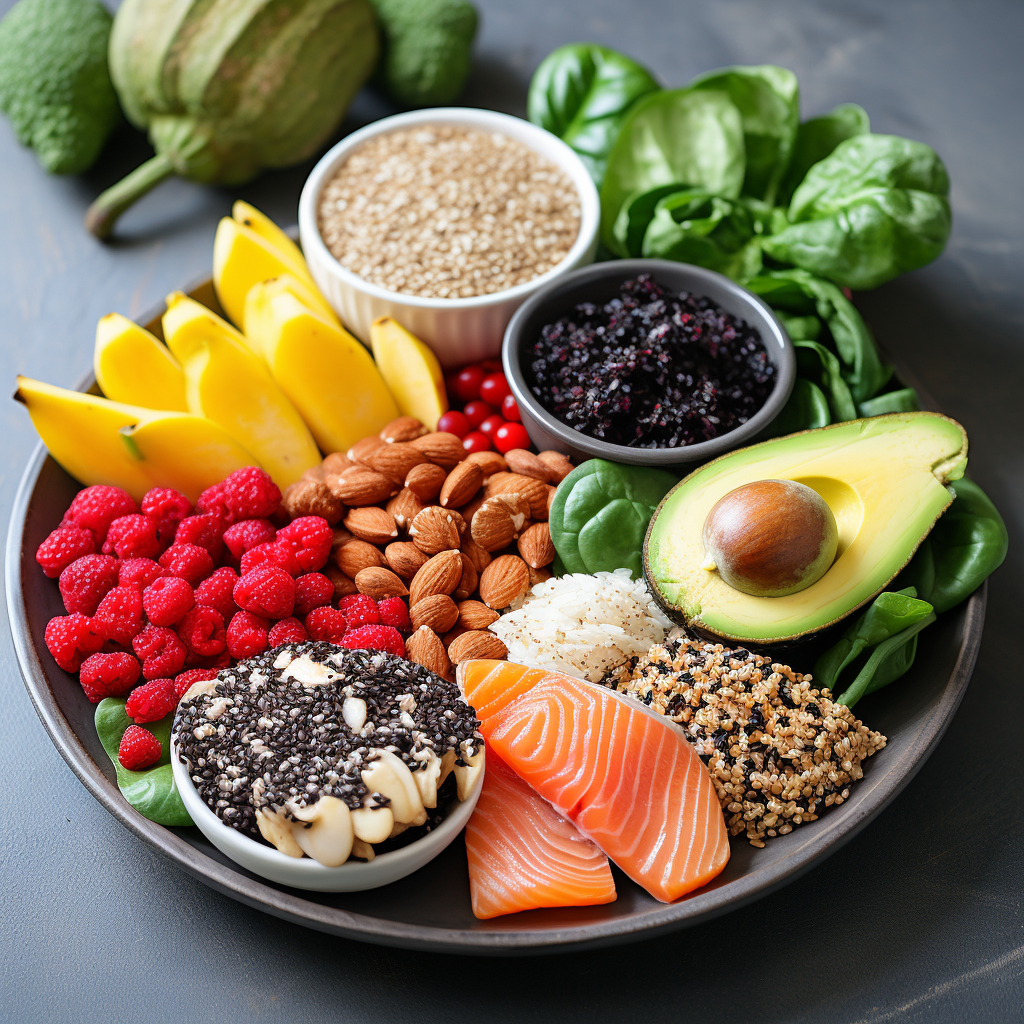
by Health And Healing AI | Mar 20, 2024 | Health, Healthy Recipes, Nutrition
Welcome to our exploration of vibrant well-being through the power of nourishing foods. Understanding where nutrients can be found is the first step in transforming your diet and, ultimately, your health. Nutrients are the building blocks of life, essential for the proper functioning of our bodies. They play a critical role in growth, healing, and maintaining a robust immune system. A nutrient-rich diet can help prevent chronic diseases, boost energy levels, and improve mental clarity.
Embarking on this wellness journey, it’s crucial to know that nutrients are abundant in various foods, each with its unique profile of vitamins, minerals, and other beneficial compounds. From leafy greens packed with vitamins A, C, and K to nuts and seeds rich in healthy fats and magnesium, understanding the diversity of nutrient sources is critical to a balanced diet.
Ready to kickstart your wellness journey? Sign up for our content to receive exclusive tips and updates. Take the first step towards a healthier, happier you! Join Our Community Today.
The Vital Vitamins and Where to Find Them

Vitamins are organic compounds that are imperative for our body to function correctly. They can be categorized into two groups: fat-soluble and water-soluble. Fat-soluble vitamins such as A, D, E, and K are stored in the body’s fatty tissue. In contrast, water-soluble vitamins like the B-complex and vitamin C must be replenished regularly as they are not stored in the body.
Finding these vitamins in food is not as daunting as it may seem. Vitamin A, for instance, is abundant in sweet potatoes, carrots, and dark leafy greens, which are excellent for eye health and immunity. The sunshine vitamin, Vitamin D, can be sourced from fatty fish like salmon, mackerel and fortified foods. Vitamin E, an antioxidant, can be found in nuts and seeds, while Vitamin K, essential for blood clotting, is rich in green leafy vegetables like kale and spinach.
When it comes to water-soluble vitamins, citrus fruits, strawberries, and bell peppers are excellent sources of Vitamin C, which is known for its immune-boosting properties. The B-complex vitamins, which include thiamine, riboflavin, niacin, and folate, can be found in whole grains, eggs, and legumes. These vitamins are crucial for energy production and maintaining proper nerve function.
Incorporating a variety of these vitamin-rich foods into your diet is beneficial for your health. It also adds color and diversity to your meals, making eating a delightful experience that nourishes both the body and the soul.
Minerals for Health: Identifying Food Sources

Much like vitamins, minerals are essential nutrients that play vital roles in maintaining bodily functions. Our bodies need inorganic elements to grow, develop, and stay healthy properly. Minerals such as calcium, magnesium, and potassium are vital for bone health, muscle function, and heart health.
Calcium, renowned for its importance in bone and teeth health, is predominantly found in dairy products like milk, cheese, and yogurt. However, for those who are lactose intolerant or follow a vegan diet, plant-based sources such as fortified plant milks, leafy greens, and almonds are also rich in calcium.
Magnesium is another mineral crucial for over 300 biochemical reactions in the body, including energy production and protein synthesis. Foods rich in magnesium include whole grains, nuts, seeds, and green leafy vegetables like spinach. It’s also present in lesser-known sources such as dark chocolate, providing an enjoyable way to meet your daily magnesium needs.
Potassium, vital for maintaining normal blood pressure and heart function, is abundant in bananas, oranges, potatoes, and tomatoes. Dietary guidelines often emphasize its role in counteracting the effects of sodium on blood pressure.
Other important minerals include iron, which is crucial for carrying oxygen in the blood and can be found in red meats and beans, and zinc, which is important for immune function and found in shellfish, seeds, and nuts. By consuming a diverse and balanced diet, you can ensure you get a wide range of minerals necessary for optimal health and well-being.
Plant-Based Nutrients and Their Superfood Sources

Transitioning to a plant-based diet does not mean compromising on the spectrum of essential nutrients. Nature’s Bounty offers a plethora of plant-based superfoods packed with vitamins, minerals, and antioxidants necessary for vibrant health. These foods are often high in fiber and phytonutrients, reducing the risk of chronic diseases.
Berries, such as blueberries, strawberries, and acai, are delicious and dense in nutrients and antioxidants. They are known to support heart health and provide a host of vitamins that promote skin health and immune function. Berries can be easily incorporated into your diet through smoothies, salads, or as a natural sweetener in oatmeal.
Leafy greens like kale, spinach, and Swiss chard are rich in iron, calcium, and a multitude of vitamins, including A, C, and K. These greens can form the base of salads, can be sautéed as a side dish, or blended into smoothies for a nutrient-packed meal.
Chia seeds and flaxseeds are known for their high omega-3 fatty acids, essential for brain health. They also contain significant fiber and protein, making them an excellent addition to breakfast bowls, baking, or as a thickener in vegan recipes.
Quinoa is a complete protein source, meaning it contains all nine essential amino acids, which is rare in the plant kingdom. It’s also a great source of magnesium and iron, making it a valuable ingredient for those following a plant-based diet.
By incorporating these and other plant-based superfoods into your diet, you’re nurturing your body with high-quality nutrients, supporting sustainable food practices, and contributing to overall planetary health.
Animal-Derived Nutrients and Optimal Food Choices
While plant-based diets are rich in numerous nutrients, certain animal-derived nutrients are pivotal for animal products. These nutrients often come in a form that the body can easily absorb and utilize, making animal products an efficient nutrient source for many.
Fatty fish, such as salmon, mackerel, and sardines, are excellent sources of omega-3 fatty acids, particularly EPA and DHA, which are known to support heart and brain health. They also provide a good dose of vitamin D, a nutrient that can be challenging to obtain in sufficient amounts from plant-based sources alone.
Eggs are often referred to as nature’s multivitamin due to their wide range of nutrients, including choline, which is essential for liver function and brain development, and lutein and zeaxanthin, which are beneficial for eye health. They are incredibly versatile and can be prepared in numerous ways to suit any meal.
Dairy products, like milk, cheese, and yogurt, are well-known for their calcium content, which is essential for bone health. They also provide protein, potassium, and vitamins B2 and B12. For those tolerating dairy, these foods can be a convenient part of a balanced diet.
When considering animal-derived nutrients, it’s essential to choose high-quality sources. Opting for grass-fed, organic, and sustainably sourced options can ensure the health benefits of these foods are maximized while also minimizing potential exposure to antibiotics and hormones often found in conventionally raised animals.
Understanding where nutrients can be found in plant-based and animal-derived foods allows for a well-rounded approach to diet and nutrition, catering to various dietary preferences and ensuring that all essential nutrients are adequately represented in one’s diet.
Balancing Macronutrients for Holistic Nutrition

Achieving a state of holistic nutrition involves more than focusing on vitamins and minerals; it requires a conscious effort to balance macronutrients—proteins, fats, and carbohydrates. Each plays a unique and vital role in supporting bodily functions and contributing to overall well-being.
Proteins are the body’s building blocks, essential for the growth and repair of tissues. They can be found in animal products, like meat and dairy, and plant-based sources, such as legumes and nuts.
Fats have been vilified, but they are crucial for hormone production, nutrient absorption, and providing an energy reserve. Healthy fats are abundant in avocados, nuts, seeds, and olive oil.
Carbohydrates are the body’s primary energy source, especially for the brain. Whole grains, fruits, and vegetables are excellent sources of carbohydrates, which also provide fiber and a plethora of other nutrients.
The key is to find the right balance that fuels your body while aligning with your lifestyle and health goals. This might mean adjusting macronutrient ratios to support athletic training, weight management, or managing health conditions.
Ready to kickstart your wellness journey? Sign up for our content to receive exclusive tips and updates. Take the first step towards a healthier, happier you! Join Our Community Today!
By understanding where nutrients can be found and how to balance them in your meals, you can empower yourself to make informed choices that nurture your body, mind, and spirit. Embrace the diversity of nutrients available across different food sources and enjoy the benefits of a balanced, nutrient-rich diet.

by Elizabeth Redd | Mar 19, 2024 | Health, Healthy Recipes, Nutrition
Welcome to a journey through the vibrant world of tomato nutrition, where each juicy bite is packed with a symphony of health benefits. Tomatoes, the versatile fruit that is a staple in cuisines worldwide, is not just a flavorful addition to meals but a powerhouse of nutrition. As we uncover what nutrition is in tomatoes, it’s evident that these red wonders are more than just a culinary delight.
Rich in vitamins, minerals, and antioxidants, tomatoes contribute significantly to a balanced diet. The presence of vitamin C, potassium, folate, and vitamin K in tomatoes supports various bodily functions from immune system defense to bone health. Moreover, the antioxidant lycopene, which gives tomatoes their signature red hue, is linked to a reduced risk of heart disease and certain cancers. But that’s just the beginning of the health secrets tomatoes hold.
Ready to kickstart your wellness journey? Sign up for our content to receive exclusive tips and updates. Take the first step towards a healthier, happier you! Join Our Community Today.
As we delve deeper into the nutritional profile of tomatoes, we’ll explore the myriad of ways this fruit can enhance your well-being. Whether eaten fresh, cooked, or as part of a sauce, the nutritional value of tomatoes remains a vital part of a health-conscious lifestyle. Let’s peel back the layers and discover the myriad of nutrients that make tomatoes an essential component of our daily diets.
The Vitamins and Minerals in Tomatoes

Diving into the heart of tomato nutrition, we find an impressive array of vitamins and minerals essential for optimal health. Tomatoes are an excellent source of vitamin C, a powerful antioxidant that plays a crucial role in immune function and skin health. Just one medium-sized tomato can provide about 28% of the recommended daily intake. They are also rich in potassium, a mineral that is vital for blood pressure control and cardiovascular health.
Furthermore, tomatoes offer a good dose of folate (vitamin B9), which is particularly important for pregnant women as it helps prevent neural tube defects in developing fetuses. They also supply a modest amount of vitamin K, essential for blood clotting and bone health. The presence of vitamin A in tomatoes, in the form of beta-carotene, supports vision and immune function.
In addition to these vitamins, tomatoes are a source of several trace minerals, including manganese and iron, which are important for various body processes, including metabolism and oxygen transport. The nutrient profile is rounded out by the presence of vitamin E, thiamine (B1), niacin (B3), and magnesium, contributing to the overall nutritional value of this humble fruit.
With this rich composition, it’s clear that incorporating tomatoes into your diet can be a simple yet effective way to ensure you’re receiving a broad spectrum of nutrients necessary for maintaining a healthy and energetic lifestyle.
Antioxidants Abound: Lycopene and Other Compounds

Tomatoes are a treasure trove of antioxidants, with lycopene being the standout compound. This powerful antioxidant gives tomatoes their characteristic red hue and is linked to a plethora of health benefits. Lycopene is known for its potential to reduce the risk of certain types of cancer, particularly prostate cancer, and has been studied for its role in heart health by possibly lowering the risk of cardiovascular disease.
But the antioxidant story doesn’t stop with lycopene. Tomatoes also contain flavonoids, such as quercetin and kaempferol, which have been researched for their anti-inflammatory properties and potential to combat oxidative stress in the body. Additionally, tomatoes are a source of vitamin C and vitamin E, both well-known antioxidants that work synergistically to enhance the body’s defense against free radicals.
The combination of these antioxidants in tomatoes can contribute to improved skin health by protecting against ultraviolet (UV) light damage, and they also play a role in long-term eye health by helping to prevent age-related macular degeneration and cataracts.
Regular consumption of tomatoes, whether fresh, cooked, or processed as tomato sauce, not only adds flavor to meals but also imbues your diet with these potent antioxidants, supporting overall health and wellness. It’s a compelling reason to make tomatoes a staple in your balanced diet.
Exploring the Caloric Content and Dietary Fiber

When examining what nutrition is in tomatoes, it’s important to understand their caloric content and the role of dietary fiber. Tomatoes are an excellent addition to a weight management diet due to their low-calorie profile. A medium-sized tomato typically contains only around 22 calories, making it an ideal food for those looking to maintain or reduce their calorie intake without sacrificing volume or nutrients.
Beyond the low caloric impact, tomatoes are rich in dietary fiber, which is essential for healthy digestion. The fiber in tomatoes helps to regulate the digestive system, aiding in the prevention of constipation and promoting regular bowel movements. Additionally, the presence of fiber contributes to a feeling of fullness, which can help curb appetite and prevent overeating.
The soluble and insoluble fibers present in tomatoes also play a role in cholesterol management. Soluble fiber has been shown to help lower total and LDL cholesterol levels, which are key factors in heart health. By incorporating tomatoes into your diet, you’re not only enjoying a delicious fruit but also taking advantage of its beneficial fiber content to support your digestive health and cardiovascular system.
How Tomato Nutrients Impact Overall Health
The array of nutrients found in tomatoes goes beyond just vitamins and minerals; these nutrients have a profound impact on overall health. Lycopene, the pigment that gives tomatoes their red color, is a powerful antioxidant. Studies suggest that lycopene may reduce the risk of certain types of cancer, particularly prostate cancer, and protect against heart diseases by preventing oxidative damage to lipids.
Tomatoes are also a source of vitamin C, which is vital for the immune system, skin health, and collagen production. Additionally, the potassium in tomatoes helps regulate blood pressure and fluid balance, while the vitamin K content is essential for blood clotting and bone health.
Another significant component is alpha-tomatine, a phytonutrient found in tomatoes that has been linked to anti-inflammatory effects and the potential to combat tumor growth. With these nutrients combined, the humble tomato offers protective benefits that extend to numerous body systems, showcasing how a diet rich in fruits and vegetables can be a cornerstone of preventive health care.
Integrating Tomatoes into Your Daily Diet

Integrating tomatoes into your daily diet can be a delightful and healthful experience. Fresh, sun-ripened tomatoes can enhance the flavor of salads, sandwiches, and wraps. Cooking tomatoes, such as in sauces, soups, and stews, not only intensifies their taste but also increases the availability of lycopene, making it easier for the body to absorb.
For those looking to get creative in the kitchen, tomatoes can be stuffed with grains or proteins, roasted to bring out their natural sweetness, or even incorporated into smoothies and juices for a refreshing nutrient boost. The versatility of tomatoes allows them to be a staple ingredient in a variety of cuisines, from Italian to Mexican, ensuring that adding them to your diet is both simple and enjoyable.
Remember, the key to reaping the full health benefits of tomatoes lies in consistent consumption as part of a balanced diet. Ready to kickstart your wellness journey? Sign up for our content to receive exclusive tips and updates. Take the first step towards a healthier, happier you! Join Our Community Today.

by Elizabeth Redd | Mar 18, 2024 | Health, Holistic Living, Nutrition
Welcome to the exciting world of nutrition and dietetics education in Singapore, where you can embark on a journey to transform your passion for health and wellness into a rewarding career. Nutrition and dietetics are fields that focus on the science of food and its impact on health, well-being, and disease management. By exploring the top nutrition and dietetics courses in Singapore, you’ll gain comprehensive knowledge and practical skills required to become a nutrition expert.
Singapore offers a vibrant educational landscape for those aspiring to delve into this critical facet of healthcare. The courses available range from diplomas to advanced degrees, all designed to equip you with the understanding of how diet affects overall health and how to create balanced meal plans for diverse populations. With a robust curriculum that combines theoretical learning and hands-on experience, these programs are tailored to meet global standards, ensuring that you are well-prepared for the challenges of a dynamic field.
Ready to kickstart your wellness journey? Sign up for our content to receive exclusive tips and updates. Take the first step towards a healthier, happier you! Join Our Community Today.!
Essential Criteria for Selecting Nutrition Courses

When considering a career in nutrition and dietetics, choosing the right course is crucial. The essential criteria for selecting nutrition courses should encompass several key factors to ensure that the education you receive meets your professional and personal growth objectives. First, accreditation is imperative; look for courses recognized by relevant health and education authorities which ensure the program meets high educational standards.
Another significant factor is the course curriculum. It should be comprehensive, covering fundamental topics such as human nutrition, food science, community health, and dietetic management. Moreover, it is beneficial if the course offers a specialization that aligns with your career aspirations, whether it’s clinical dietetics, sports nutrition, or public health nutrition.
Diverse and hands-on learning experiences are also vital. Courses that provide practical training through internships or laboratory work will give you an edge by allowing you to apply theoretical knowledge to real-world scenarios. Additionally, the faculty’s expertise and the support services available to students, such as career counseling and alumni networks, are factors that can greatly influence your educational experience and future opportunities.
Finally, consider the flexibility of the program to fit your lifestyle, whether it offers part-time learning, online modules, or evening classes. Balancing your education with other life commitments can be a critical factor in your success and overall satisfaction with the course.
Top Universities Offering Dietetics Programs

Singapore is home to several prestigious institutions offering top-tier nutrition and dietetics courses. These universities are renowned for their rigorous academic standards, state-of-the-art facilities, and their commitment to producing industry-ready professionals.
Among the leading universities is the National University of Singapore (NUS), which provides a comprehensive Bachelor’s and Master’s program in Dietetics. The curriculum at NUS is designed to equip students with the necessary scientific knowledge and practical skills needed to excel in the field of nutritional science.
Another notable institution is Singapore Management University (SMU), known for integrating business principles with dietetic education, preparing students for the competitive food and nutrition industry. SMU emphasizes a balance between theory and practical application, with opportunities for students to engage in research and internships.
For those interested in a more specialized approach, the Singapore Institute of Technology (SIT) offers programs focused on clinical nutrition and dietetics. These courses are often developed in collaboration with international partners, providing a global perspective to the students’ education.
Lastly, the James Cook University Singapore campus presents unique opportunities for students to study nutrition and dietetics within a multicultural environment, offering insights into diverse dietary patterns and health challenges faced in different populations.
Each of these institutions has its own strengths, and prospective students should consider factors such as faculty expertise, research opportunities, and the university’s network within the healthcare industry when choosing the program that best aligns with their career objectives.
Career Opportunities in Nutrition and Dietetics

The field of nutrition and dietetics is vast, offering a wealth of career opportunities for graduates of nutrition and dietetics courses in Singapore. With a qualification in this field, individuals can look forward to a dynamic and fulfilling career path that can make a significant impact on public health and individual well-being.
Dietitians and nutritionists can find employment in a variety of settings, including hospitals, where they provide medical nutrition therapy to patients with various health conditions. In addition, community health centers, public health organizations, and governmental agencies often seek professionals to lead nutrition education and disease prevention programs.
For those with an entrepreneurial spirit, the private sector offers opportunities in food service management, corporate wellness, and consultation services. Graduates can also pursue careers in research and academia, contributing to the advancement of nutritional science and educating future generations of dietitians.
Moreover, the fitness and sports industry is another area where nutrition experts are in demand, providing tailored nutritional strategies to athletes and fitness enthusiasts to enhance performance and recovery.
With the increasing focus on preventive healthcare and the growing awareness of the role of nutrition in managing chronic diseases, the demand for qualified nutrition and dietetics professionals is expected to rise. This trend underscores the importance of a solid education in this field and the promising career prospects that await diligent students.
Integrating Holistic Health into Dietetics Education

As the interconnection between diet, lifestyle, and overall health becomes increasingly recognized, nutrition and dietetics courses in Singapore are evolving to include a more holistic approach to health and wellness. This integration ensures that future dietitians and nutritionists are prepared to address not only the physical but also the emotional and spiritual aspects of health.
Modern dietetics education now often encompasses topics such as mindfulness, stress management, and the impact of sleep and mental health on nutritional status. This broadened perspective equips graduates with the skills to provide comprehensive care that considers all facets of a person’s life. Understanding the cultural and psychosocial factors that influence eating habits is also critical, as these can significantly affect dietary choices and overall health.
Students are encouraged to explore the principles of functional nutrition, which looks at the root causes of health issues and uses food as a means to correct underlying imbalances. This approach is complemented by education on sustainable food systems, which emphasizes the importance of eco-friendly practices and the consumption of locally sourced, organic foods.
The goal of integrating holistic health into dietetics education is to produce well-rounded professionals who can support clients in making lifestyle changes that positively affect their long-term health outcomes. By understanding the interconnectedness of the body’s systems and the role of nutrition in maintaining balance, dietitians can offer more personalized and effective dietary interventions.
Leveraging Technology for Enhanced Learning in Nutrition
Ready to kickstart your wellness journey? Sign up for our content to receive exclusive tips and updates. Take the first step towards a healthier, happier you! Join Our Community Today.!
In the realm of nutrition and dietetics courses in Singapore, technology is playing a pivotal role in enhancing the learning experience for students. Cutting-edge tools and platforms are being leveraged to facilitate a more interactive and engaging educational process. Virtual reality (VR) simulations, for example, allow students to immerse themselves in clinical scenarios, honing their skills in a safe, controlled environment before practicing on real patients.
Online learning platforms have expanded the accessibility of nutrition education, enabling students to learn at their own pace and convenience. These platforms often include interactive modules, quizzes, and video lectures that cater to various learning styles. Moreover, mobile apps are available to assist students in tracking diet and nutrition, offering a practical approach to understanding the impact of dietary choices in real-time.
Artificial intelligence (AI) and machine learning are also making their way into the curriculum, teaching students how to analyze vast quantities of data to recognize patterns and predict trends in nutrition and health. With these technological advancements, the future of dietetics education is becoming increasingly dynamic, equipping graduates with the digital literacy to lead the way in health innovation.
By embracing these technological tools, nutrition and dietetics programs ensure that they stay at the forefront of educational excellence, preparing students to meet the demands of a rapidly evolving healthcare landscape.
Join Our Community Today and unlock your potential for optimal health and happiness with evidence-based practices and support from our community!

by Elizabeth Redd | Mar 17, 2024 | Holistic Living, Mindful Wellness, Nutrition
In today’s interconnected and ever-evolving marketplace, a holistic brand strategy is more than just a buzzword; it’s a vital approach for businesses aiming to create a resonant and enduring brand. By considering every aspect of a company’s presence and the myriad ways consumers interact with it, a holistic strategy ensures a consistent and cohesive brand experience. This means aligning the company’s mission, values, and storytelling across all platforms and touchpoints, from product design and marketing communications to customer service and corporate culture.
At the core of this approach is the recognition that each component of a brand is interconnected, and any change in one area can ripple through the others. Therefore, companies must operate with a clear vision and an integrated strategy that permeates every aspect of their operations. A successful holistic brand strategy not only enhances customer recognition and loyalty but also fosters an internal culture of unity and purpose. By seamlessly integrating the message and aesthetics, businesses can articulate a clear brand promise and deliver it effectively, gaining trust and building a solid customer base in the process.
Ready to kickstart your wellness journey? Sign up for our content to receive exclusive tips and updates. Take the first step towards a healthier, happier you! Join Our Community Today!
The Rise of Holistic Health Brands in the Marketplace

As consumers become increasingly aware of the importance of health and wellness, the marketplace is witnessing a significant surge in the demand for holistic health brands. These brands are gaining traction because they offer more than just products; they provide an integrative approach to wellbeing that resonates with modern consumers’ desire for authenticity and mindfulness. Holistic health brands often encompass a variety of products and services, from natural supplements and organic foods to mindfulness apps and wellness retreats, all designed to promote a balanced lifestyle.
One of the key drivers behind this growth is the consumer’s heightened preference for transparency and sustainability. People are looking for brands that not only talk about health but also embody it through responsible business practices and a clear commitment to social and environmental causes. This alignment of brand values with personal values is crucial in establishing a strong customer relationship. Moreover, the integration of technology has allowed these brands to create personalized experiences and foster community engagement, further strengthening their position in the marketplace.
The holistic health sector is not just growing; it’s evolving. With each advancement, these brands are setting new standards for what it means to live and consume conscientiously. As they continue to innovate and connect with customers on a deeper level, holistic health brands are not just riding a trend; they are shaping the future of the health and wellness industry.
Aligning Core Values with Holistic Branding

At the heart of any strong holistic brand lies a set of core values that defines its mission and guides its actions. When these values are deeply embedded in the brand’s identity, they create a powerful narrative that can resonate with individuals on a personal level. For a holistic brand, this is particularly crucial, as it reflects an all-encompassing approach to health and wellness that goes beyond the product itself.
Aligning core values with branding is not just about marketing; it’s about building a relationship of trust and loyalty with consumers. Brands that succeed in this alignment are often those that practice what they preach. This means that their business operations, from sourcing materials to employee relations and community involvement, are consistent with their values of health, sustainability, and integrity. By doing so, they communicate a clear and compelling message that is holistic in every sense of the word.
Furthermore, consumers today are more informed and discerning than ever before. They seek out brands that are authentic and transparent, and they are willing to invest in companies that prove their commitment to a greater good. This is where holistic branding shines, as it encapsulates a comprehensive, purpose-driven view that elevates a brand from a mere seller of goods to a partner in the consumer’s wellness journey. In this way, aligning core values with holistic branding is not just good business sense; it’s a path to meaningful connection and sustained success in the marketplace.
Case Studies: Successful Holistic Brand Strategies

Examining real-world examples of successful holistic brand strategies reveals the tangible impact of this approach on business growth and customer loyalty. One notable case is that of a well-known organic food company that has built its brand around the idea of nourishment for the body and soul. Their commitment to organic farming, sustainable packaging, and fostering community health initiatives has made them a favorite among health-conscious consumers.
Another example comes from the beauty industry, where a leading skincare brand has centered its philosophy on the interconnectedness of skin health and emotional well-being. By using natural ingredients, promoting self-care rituals, and supporting environmental causes, the brand has cultivated a devoted following that believes in its holistic vision.
These case studies illustrate that a holistic brand strategy can be effectively applied across various industries. By maintaining a focus on comprehensive wellness and integrating it into every aspect of the business, brands can create a distinct identity that not only stands out in a competitive market but also engenders deep brand loyalty. The success stories of these companies reinforce the premise that a holistic approach to branding is not just a trend, but a powerful strategy for building a resilient and beloved brand.
Challenges and Considerations in Adopting a Holistic Approach
While adopting a holistic brand strategy offers numerous benefits, it is not without its challenges and considerations. Brands must ensure authenticity at every touchpoint, which requires a deep commitment and often a shift in company culture. This might involve revamping supply chains to ensure ethical sourcing, training staff extensively on brand values, or investing in sustainable business practices, which can be resource-intensive in the short term.
Additionally, consistency is key in holistic branding. A misalignment between messaging and actual practices can lead to consumer distrust. Brands must consistently deliver on their promises across all channels and experiences, which demands meticulous planning and execution. This level of detail-oriented management can strain resources, especially for smaller businesses.
There is also the risk of overextending the brand’s reach. In an effort to be ‘everything to everyone’, brands may dilute their core message, leading to confusion about what they truly represent. Therefore, it’s critical for brands to maintain clarity in their holistic messaging, ensuring that every initiative is aligned with the brand’s core values and mission.
In summary, while the integration of a holistic way into a brand strategy holds potential for deep customer engagement and differentiation in the market, it demands rigorous attention to authenticity, consistency, and focused messaging. For businesses considering this path, it’s important to weigh these challenges against the potential rewards and to proceed with a clear, strategic plan for holistic integration.
Measuring the Impact of a Holistic Brand on Consumer Behavior

Once a holistic brand strategy is in place, measuring its impact on consumer behavior becomes essential to understand its efficacy. Companies must track a range of metrics, from brand awareness and perception to consumer loyalty and advocacy. Surveys, focus groups, and social media analytics offer valuable insights into how consumers perceive the brand holistically. Monitoring online interactions and feedback can reveal shifts in public sentiment and engagement levels, indicating the brand’s resonance with its audience.
Furthermore, sales data and customer retention rates can provide tangible evidence of the holistic approach’s success. An increase in repeat purchases or a growing base of loyal customers often signals that the brand’s values and practices are resonating with consumers. Brands should also pay attention to market share and how it fares against competitors who may not employ a holistic strategy.
It’s important for brands to set clear objectives and benchmarks for their holistic brand strategy. This allows for the tracking of progress over time and making necessary adjustments to ensure the brand continues to connect with consumers on a deeper level. Through regular assessment and adaptation, businesses can fine-tune their approach, enhancing the overall impact of their holistic brand on consumer behavior.
Ready to kickstart your wellness journey? Sign up for our content to receive exclusive tips and updates. Take the first step towards a healthier, happier you! Join Our Community Today.

by Elizabeth Redd | Mar 2, 2024 | Health, Healthy Recipes, Nutrition
Welcome to the invigorating world of nutrition drinks, a realm where taste meets the pinnacle of health enrichment. In today’s fast-paced lifestyle, finding the right balance of nutrients can be a challenge, and that’s where these wholesome beverages come into play. Offering a convenient and delicious way to fuel your body, nutrition drinks have become a cornerstone for those seeking to enhance their well-being.
Whether you’re a fitness enthusiast, someone with specific dietary needs, or simply looking to improve your overall health, the quest to find ‘nutrition drinks near me’ can lead you to an array of local spots that specialize in these revitalizing elixirs. From organic juice bars to health food cafes, there are plentiful options to explore.
Ready to kickstart your wellness journey? Sign up for our content to receive exclusive tips and updates. Take the first step towards a healthier, happier you! Join Our Community Today.
As we delve deeper into the local landscapes that offer these nutrient-packed beverages, we aim to guide you through the top spots where you can find the perfect nutrition drink to complement your lifestyle. So, let’s raise a glass to your health and explore the best local venues that cater to your body’s needs.
Discovering Local Nutrition Drink Hotspots

Embarking on the journey to discover local nutrition drink hotspots can be both exciting and beneficial for your health. These hotspots are treasure troves of beverages crafted with vitamins, minerals, and other essential nutrients that support a balanced diet. To uncover these gems, consider starting with health-focused cafes and smoothie shops that are popping up in neighborhoods everywhere. These establishments often pride themselves on using fresh, high-quality ingredients to create drinks that are not only nutritious but also incredibly flavorful.
Another way to find nutrition-rich drinks is to frequent local farmers’ markets or organic grocery stores. Many vendors offer freshly squeezed juices or homemade concoctions that prioritize natural and organic produce. For those with specific health goals or dietary restrictions, specialized nutrition shops and wellness centers can provide tailored options, including meal replacement shakes, protein-packed smoothies, and detox juices, ensuring that you find the perfect drink to fit your individual needs.
Exploring these local nutrition drink hotspots not only supports your physical health but also promotes local businesses and sustainable practices. By choosing to patronize these establishments, you’re making a positive impact on your community while nurturing your body with the best nutrition available.
The Health Benefits of Nutrient-Rich Beverages

Nutrient-rich beverages are more than just a trend; they are a cornerstone in the pursuit of a healthy lifestyle. Consuming drinks that are densely packed with vitamins, minerals, and antioxidants can have profound effects on your overall health. These beverages, including smoothies, green juices, and fortified drinks, can contribute to improved digestion, enhanced immune function, and increased energy levels. By incorporating a variety of fruits, vegetables, and supplements, these drinks ensure that your body receives a broad spectrum of nutrients necessary for optimal function.
For those looking to manage their weight, nutrition drinks can serve as a nutritious snack or meal replacement, helping to curb hunger and provide essential nutrients without excessive calories. They can also play a crucial role in post-workout recovery, delivering protein and carbohydrates that aid in muscle repair and replenishment of glycogen stores. Moreover, certain nutrient-enriched drinks are designed to support heart health, with ingredients known to lower blood pressure and improve cholesterol levels.
It’s important to recognize that not all nutrition drinks are created equal. To fully reap the health benefits, it’s essential to choose beverages that are low in added sugars and free from artificial additives. By prioritizing quality and whole-food ingredients, you can enjoy delicious drinks that contribute positively to your health and well-being.
Navigating Nutrition Drinks for Special Diets

Finding nutrition drinks near me that align with special dietary requirements can be a significant concern for those with specific health needs or preferences. Whether you’re adhering to a vegan, gluten-free, keto, or low-FODMAP diet, there are options available that cater to these unique nutritional profiles. When seeking out beverages, it’s crucial to scrutinize ingredient lists for potential allergens or non-compliant components that could disrupt your diet.
For individuals on a plant-based diet, vegan-friendly drinks that utilize pea protein, hemp, or brown rice as their protein source are excellent choices. These are not only compatible with a vegan lifestyle but are also generally easier to digest and can be beneficial for those with dairy intolerances. Similarly, people with celiac disease or gluten sensitivity should opt for nutrition drinks that boast a gluten-free label, ensuring the absence of wheat, barley, or rye derivatives.
Those following a ketogenic diet must seek out drinks with high fat and low carbohydrate content, avoiding sugar-laden options that could impede ketosis. On the other hand, low-FODMAP individuals need to avoid drinks with certain sweeteners and fibers that can exacerbate gastrointestinal issues. It’s always recommended to consult with a healthcare professional or registered dietitian to help navigate the best nutrition drink choices for your specific dietary needs, ensuring that you maintain both the integrity of your diet and your health.
The Rise of Organic and Plant-Based Drink Options

The health-conscious consumer’s demand for clean and sustainable products has given rise to a burgeoning market of organic and plant-based drink options. These beverages cater not only to those looking for nutrition drinks near me but also to anyone aspiring to a more natural and environmentally friendly lifestyle. Organic drinks are made from ingredients cultivated without synthetic pesticides or fertilizers, offering a purer taste and the peace of mind that comes with reduced exposure to potentially harmful chemicals.
Plant-based drinks, on the other hand, have soared in popularity due to their ethical, environmental, and health benefits. Ranging from almond and soy to oat and coconut, these dairy alternatives have become staples in coffee shops and supermarkets alike. They not only serve vegans and those with lactose intolerance but also appeal to a broader audience that is choosing plant-based products for their lower carbon footprint and potential health advantages.
Moreover, many of these organic and plant-based beverages are fortified with vitamins and minerals, making them nutritionally comparable to their conventional counterparts. With a growing awareness of the impacts of diet on health and the environment, these drink options are becoming an integral part of a balanced, responsible diet. As consumers become more informed and selective, the trend toward organic and plant-based nutrition drinks is expected to continue its upward trajectory.
Crafting the Perfect Nutrition Drink Experience
Embarking on the quest for the perfect nutrition drink experience involves more than just picking a beverage off the shelf. It’s about discovering flavors and ingredients that not only satiate your taste buds but also contribute to your overall well-being. Creating the ideal nutrition drink is an art that combines taste, health benefits, and individual dietary needs into a harmonious symphony of refreshment.
Begin by considering your personal health goals. Are you looking for a post-workout recovery aid, a meal replacement, or a daily wellness booster? Once you’ve identified your objectives, seek out drinks with high-quality proteins, essential vitamins, and minerals, and be mindful of sugar content. For those with specific dietary restrictions, the market offers a wealth of options, including gluten-free, keto-friendly, and vegan nutrition drink choices.
Don’t forget the role of locality and freshness. A ‘nutrition drinks near me’ search can lead you to local health food stores and farmer’s markets, where freshly made juices and smoothies, packed with local and organic ingredients, are often available. By supporting these local businesses, you’re not only getting a fresher product but also contributing to the local economy and reducing your carbon footprint.
Ready to kickstart your wellness journey? Sign up for our content to receive exclusive tips and updates. Take the first step towards a healthier, happier you! Join Our Community Today.!

by Elizabeth Redd | Mar 1, 2024 | Health, Healthy Recipes, Nutrition
Welcome to the journey of uncovering what nutrition is in potatoes. These earthy treasures are more than just comfort food; they are packed with an array of nutrients that are vital for maintaining good health. As we delve into the various components that make up the nutritional profile of potatoes, we’ll also explore the surprising health benefits they offer. Potatoes are not just a staple carbohydrate; they are a source of vitamins, minerals, and dietary fiber that can contribute to your overall wellness.
Whether you love them baked, boiled, or mashed, understanding the nutritional makeup of potatoes can help you make informed decisions about how they fit into a balanced diet. So, let’s embark on this educational foray into the world of potato nutrition and discover how this humble tuber can play a role in a health-conscious lifestyle.
Ready to kickstart your wellness journey? Sign up for our content to receive exclusive tips and updates. Take the first step towards a healthier, happier you! Join Our Community Today.!
Exploring the Vitamins and Minerals in Potatoes

Digging deeper into the nutritional content of potatoes, one finds an impressive array of vitamins and minerals essential for the body’s various functions. Potatoes are a notable source of vitamin C, which is not only a powerful antioxidant but also plays a crucial role in immune system support, skin health, and iron absorption. They also provide significant amounts of vitamin B6, which is vital for healthy brain development and function, as well as for maintaining a robust nervous system.
On the mineral front, potatoes boast a high potassium content, which is key for maintaining normal blood pressure and heart function. They also contain magnesium and iron, minerals that are indispensable for energy production and oxygen transport, respectively. Additionally, potatoes are a source of zinc, which is necessary for immune function and wound healing, and phosphorus, which is important for the formation of bones and teeth.
It is important to note that the nutritional value can vary depending on the type of potato and the preparation methods. For example, consuming potatoes with their skin on increases the intake of dietary fiber and nutrients, as many vitamins and minerals are contained just beneath the skin. Incorporating potatoes into a balanced diet can help ensure that you are getting a broad spectrum of the nutrients your body needs to thrive.
The Role of Antioxidants and Phytonutrients in Potatoes

Beyond their vitamins and minerals, potatoes are also packed with antioxidants and phytonutrients, compounds that play a significant role in protecting the body against disease. These bioactive components can neutralize harmful free radicals, which are unstable molecules that can cause oxidative stress and damage to cells. Oxidative stress is associated with various chronic diseases, including heart disease, cancer, and diabetes.
Potatoes contain flavonoids, carotenoids, and phenolic acids – all types of antioxidants. Notably, the purple and red varieties of potatoes have high levels of anthocyanins, which have been shown to have strong antioxidant properties. Additionally, potatoes are a source of a phytonutrient known as chlorogenic acid, which is one of the most abundant polyphenols in the diet and has been linked to reducing the risk of cardiovascular diseases.
The inclusion of potatoes in your diet contributes to an increased intake of these beneficial compounds. However, it’s worth noting that the way potatoes are cooked can affect their phytonutrient content. For example, frying potatoes can significantly reduce the levels of antioxidants compared to boiling or steaming. To maximize the health benefits, it is advised to prepare potatoes in ways that maintain their nutrient integrity.
Understanding the Carbohydrates and Fiber Content

Potatoes are often recognized for their carbohydrate content, which serves as a primary energy source for the body. The carbohydrates in potatoes are mostly in the form of starch, with a small portion made up of simple sugars such as glucose, fructose, and sucrose. While carbohydrates are essential for energy, it’s important to consider the type and quality of carbohydrates consumed.
Potatoes also offer dietary fiber, especially when the skins are consumed. Fiber is a crucial component for digestive health, aiding in bowel regularity and fostering a healthy gut microbiome. It has additional health benefits, such as helping to regulate blood sugar levels and contributing to a feeling of fullness, which can support weight management efforts. A medium-sized potato with skin provides about 4 grams of fiber, which is 16% of the recommended daily intake.
Interestingly, potatoes contain resistant starch, especially when cooked and then cooled. Resistant starch is not digested in the small intestine but instead ferments in the large intestine, acting similarly to dietary fiber. This has been linked to several health benefits, including improved insulin sensitivity, lower blood sugar levels, and increased satiety. To make the most of this benefit, one could include cold potatoes in salads or enjoy them as part of a meal that has been prepared in advance.
Protein and Amino Acids Profile of Potatoes
While potatoes are not typically hailed as a high-protein food, they do contain a modest amount of protein that can contribute to one’s daily intake. A medium-sized potato offers approximately 3 grams of protein, which is about 6% of the daily value for the average adult. This protein is packed with various amino acids, which are the building blocks of proteins in our bodies.
Potatoes contain a spectrum of amino acids, including essential ones that the body cannot synthesize and must obtain from the diet. Notably, potatoes are a good source of the amino acid lysine, which is often lacking in grain-based diets. Lysine is vital for proper growth, tissue repair, and the production of hormones, enzymes, and antibodies.
It’s also worth mentioning that the protein quality in potatoes is generally high, meaning their protein is well-utilized by the human body. This is particularly beneficial for those who rely on plant-based sources for their protein needs. Combining potatoes with other protein sources, such as legumes, can provide a complete protein profile, ensuring that all essential amino acids are present in adequate amounts for the body’s requirements.
Incorporating potatoes into a balanced diet can thus support not only energy needs but also contribute to muscle maintenance and overall body function thanks to its protein and amino acids content.
Debunking Myths: The Truth About Potatoes and Weight Management

Debunking myths surrounding potatoes and weight management is essential in understanding their role in a healthy diet. Contrary to popular belief, potatoes in their whole, unprocessed form are not inherently fattening. In fact, they can be part of an effective weight management plan due to their high satiety index, which helps people feel full longer and may reduce overall calorie intake.
Potatoes are rich in dietary fiber, especially when consumed with their skin. Fiber aids in digestion and can help prevent overeating by promoting a feeling of fullness. Additionally, the resistant starch found in cooled cooked potatoes acts as a prebiotic, nourishing beneficial gut bacteria which is linked to improved metabolism and weight control.
However, it’s important to consider the method of preparation and serving size when including potatoes in a weight management plan. Opting for baking, boiling, or steaming rather than frying, and being mindful of added high-calorie toppings like butter, sour cream, or cheese, can allow one to enjoy potatoes without compromising their weight goals.
Understanding the nutritional profile of potatoes and recognizing the impact of cooking methods on caloric content empower individuals to make informed decisions about including this versatile vegetable in their diet. Ready to kickstart your wellness journey? Sign up for our content to receive exclusive tips and updates. Take the first step towards a healthier, happier you! Join Our Community Today.






















